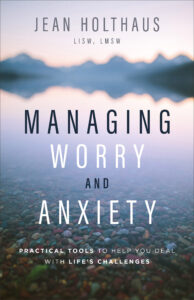How Judging Can Increase Your Anxiety
I grew up memorizing scripture verses like,
“Judge not, that you be not judged.”
(Matthew 7:1 ESV)
As I suspect many of you did. When I learned this verse, I found it a bit scary. Since God is the ultimate judge, I feared judging and then having to face God’s condemnation—talk about scary! Since I’m not a theologian, we aren’t going to consider whether my interpretation of scripture was correct. Instead, we’re going to look at how, in this verse, God is attempting to protect us from ourselves.
When are we judging?
We judge every time we decide something
- is right or wrong
- is good or bad
- should happen or shouldn’t happen.
If you look at the last several hours of your life, you—like me—may find you have judged numerous times. This afternoon, I’ve judged the person I had an appointment with shouldn’t be late, the young man in the crosswalk should know better than to wear those shoes, the tattoos on the woman sitting next to me were hideous…(you get the idea).
While I would never say those things out loud, my internal dialogue is peppered with judgments. Judging is a habit and it’s a habit that doesn’t stop with just judging others—we also judge ourselves relentlessly. While most of us never speak our judgments about others aloud, the litany of self-judgments we make plays in our head all day long tearing us down, destroying our self-concept, and causing us anxiety.
What is judging?
We judge when we
- take a group of facts (my two friends are glancing at me as they talk with one another and giggle)
- form an opinion or belief about those facts (they are talking about me because they think I’m stupid)
- act upon the opinion/belief as though it were a fact.
Facts themselves normally have very little emotional charge. However, when I add my judgment to them, I now feel incredibly anxious as I begin to wonder
…why are they talking about me
…what did I do to make them think I’m stupid
…what if they decide they don’t want to be my friend any more…etc.
Judging creates emotional pain, fills us with anxiety, and makes it hard to be effective.
How do we stop judging?
Like any habit, it takes work to stop judging. By persistently practicing these four steps, you can begin to break your judging habit:
-
Find the Facts
Separate the facts from the feelings, beliefs, and opinions.
- To practice this, look at yourself in a full-length mirror. Write down all the things you say to yourself as you look in the mirror.
Your self-talk might include statements like: I look so dumpy in sweats and my hair is an absolute disaster…I should never have gone to the grocery store looking like this. - Now, look for the facts in your self-talk.
The facts in the scenario above include I’m wearing sweats and I went to the grocery store. None of the rest of the statement were facts!
2. Let Go of Judgment
Change requires a willingness to let go of judgments. I can hear some of you saying, “But my hair really was a disaster.” I promise we will look at what to do with opinions, but first we need to label them as opinions and stop treating them like facts!
3. Unconditionally Accept Reality
Often, what creates our anxiety and distress is judging what is present against what we believe “should” be present. “My hair is a disaster” is a judgment of what my hair looks like against what I think it should look like. Until we accept what is present, we can’t change a thing!
- Continuing to believe you should be different than you are, makes you anxious and full of self-doubt and doesn’t motivate change! Accepting yourself as you are, puts you in a position to begin making changes.
- Accepting the current moment doesn’t mean you like it or agree with it. For example, no one likes having cancer. However, until someone accepts they have cancer, they can’t do anything to treat it. Once they accept it, they are positioned to make a battle plan and move forward.
- Accepting reality means letting go of our internal dialog about how unfair, wrong, or unmanageable the situation is. Instead, we need to develop self-talk like, “This is the situation I’m in and God is in it with me.”
4. Do What Brings Life
Once you accept the situation, you’re now positioned to make a change. If you don’t like your hair the way it looks, you can change it (no condemnation needed to motivate the change!). If you have cancer, make a plan to treat it. By letting go of judging, you are freed to move forward by doing things that will make you as fully alive as possible.
Scripture says the thief comes to “steal kill and destroy.” One of the ways he does this is by inviting us to judge ourselves and everyone else. However, Jesus goes on in the same verse to say He came so we could “have life and have it to the full” (John 10:10 NIV). When we break the judgment habit in our lives, we become free to live fully alive and fully enjoying each moment of the life we have.
“Anxiety” is a word that is coursing through everyday life. You see it on social media and news articles; you hear about it firsthand from friends and family, and you may even experience it yourself.
The pressures and demands of today’s culture certainly weigh on everyone, but hope is not lost. With over 25 years as an experienced counselor, Jean Holthaus invites you to take back control of your life. Stop letting worry and anxiety hold you back and learn how to live in the present moment, suspend judgment, and believe yourself to be competent and equipped by God.










